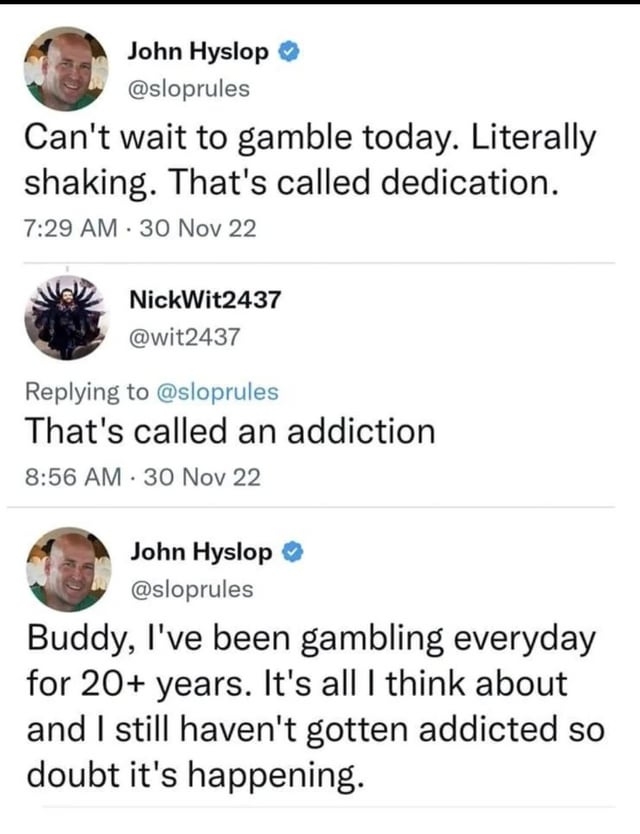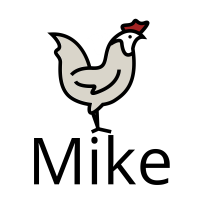seriously! like how do you become addicted to coffee, I drink it regularly but I can’t say I am caffeine addict or something. how one become a caffeine addict?
You don’t get ‘addicted’ to caffeine. If you consume it daily your body will adjust to the new baselines and discontinuing will have symptoms (headache for a day, tired, etc…), but it is not a clinical addiction.
Edit: caffeine does not have a “Substance Use Disorder”, merely a “Withdrawal Syndrome” (DSM-V pg. 482)
I think your definition of addiction here is very narrow and most people would think that if there are withdrawal symptoms like you describe then that would qualify as an addiction.
I guess “clinical addiction” might mean an addiction which requires clinical intervention but I could imagine a hoarder who is “addicted” to collecting junk who requires a psychiatrist to break their pattern of compulsive behaviour.
No, the word ‘addicted’ is overused and simplified. People are ‘addicted’ to chocolate, and sweets. To their loved one’s kisses. That is not what it means, particularly to those that are, in fact, addicted. In everyday quaint usage it is cute. Meant to deflect accusations (internal or otherwise) of poor impulse control.
Real addiction alters body chemistry. The body doesn’t simply ‘acclimate’. It functionally depends on the addictive substance. Claiming a headache due to withdrawal = addiction is like saying shivering taking out the garbage in shorts during winter = warmth addiction. Not even close to going into shock and your heart stopping due to alcohol withdrawal.
Actual addiction alters mental thinking and results in negative lifestyle effects. When is the last time you sold your body for a shot of espresso? Does drinking coffee everyday cause you to avoid friends/coworkers or result in depression? Would you forget to feed your kids if the kitchen was out of teabags?
;tldr Addiction is clearly defined and caffeine is not one of the substances known to cause it. Hence why tea and coffee are served at most [Addicts] Anonymous meetings. “Like it a lot” is not the same as “addicted to”.
I still disagree but can understand your perspective.
Actual addiction alters mental thinking and results in negative lifestyle effects.
This is prefrontal cortex. It’s dysregulation of neurotransmitters, largely impacted by just how strong the dopamine hit is. Gambling, for example, uses the exact same mechanism as crack to form the neurotransmitter imbalances that lead to people willing to sell their souls for one more hit, and the physical withdrawal is pretty much irrelevant to that impact.
Caffeine is the same thing. It’s less addictive, but it very obviously is addictive by every definition.
Caffeine doesnt get substance use disorder in the DSM because people would riot if it did. It’s too ingrained in our culture.
That’s simply not true.
Ignoring that the habit formation is the most effective mechanism towards long term dependence and why rehab/treatment from people who genuinely want to stop often “doesn’t take”, caffeine also causes physical dependence, with meaningful withdrawal symptoms.
No, it is not physical dependence. It is acclimation. A habit is not addiction.
Someone drinking coffee daily for years could stop cold turkey for a day, drink some water and take 2 doses of aspiring throughout that day and actually reduce their coffee consumption once resuming without realizing it due to increased efficacy returning to baseline. The person would go through that day normally despite the predicable headache from blood vessel dilation.
A cigarette smoker going cold turkey for a day does NOT have that experience. After the first hour or so every minute of the day would be thinking about needing a cig, and depending on the severity of their addiction could experience serious life-threatening withdrawal symptoms.
[Addicts] Anonymous meetings serve coffee and tea because it is not addictive. It never ceases to amaze me how insistent people are to defend this mistaken idea that caffeine is addictive and yet we’ll let teens drink it without restriction, and serve it to actual addicts.
Here’s an idea, if you genuinely believe caffeine is addictive start lobbying to set age limits to consumption, or protesting in front of Starbucks.
You very clearly have no knowledge of what the research on addiction says, because this is all complete and utter bullshit.
If physical dependence was the primary issue with addiction, weaning would work. Shockingly, it doesn’t.
Cravings aren’t physical withdrawal. They’re caused by your brain expecting a different balance of neurotransmitters than it receives. Your body also adapts in other ways to drugs to prevent them from killing you as you increase your dosage, but the entire reason you increase your dosage is because the prefrontal cortex is “designed” to decrease the stimulation of the same behavior as the habit is learned, and the goal of hard drugs (again, along with other thrill seeking behavior, and gambling) is to chase that high stimulation. That loop is why you constantly need more, and it’s the habit formation of that loop that defines addiction.
This is all very basic, well understood stuff. The actual low level details are hard to pin down, but the fact that addiction is habit formation caused by neurotransmitter fuckery isn’t something that’s debated by anyone relevant.
So well understood caffeine isn’t in the list of compounds forming addictions. You’re the ignorant one trying to equate a habit with addiction. I look forward to seeing you protesting in front of Starbucks and getting laughed at.
habit formation of that loop that defines addiction.
No, it’s the negative impact on lifestyle that defines addiction actually, but you can get addicted before even having formed a habit. Smoke a couple cigarettes the first day and you’ll have withdrawal the next. A couple hard drugs literally get you hooked first try.
Seriously, stop polluting this community with your ignorance.
Just want to chime in with a few things
First and most importantly - drop the attitude, please, everyone. We can have a civil conversation about this topic and disagree in a healthy way. You’ll never convince someone of anything by calling them “ignorant”.
Now, to the debate:
caffeine isn’t in the list of compounds forming addictions
Whose list? Can you share your reference here? Is it the DSM?
negative impact on lifestyle that defines addiction
I would argue that caffeine does have a negative impact on ones lifestyle. While it is substantially lighter than other substances, the inability to function normally without your morning cup of coffee is a bigger deal, in my mind, than most people realize.
And to your later point I do not believe we should be giving kids caffeine. They don’t need it and it starts an unhealthy relationship early. Of course, that’s just my opinion as a caffeine-avoider
Whose list? Can you share your reference here? Is it the DSM?
Pg 482 of the DSM-V
Caffeine has a withdrawal syndrome, but is not something associated with substance abuse disorder. People mistake withdrawal for addiction when it is only half the story.
the inability to function normally without your morning cup of coffee is a bigger deal, in my mind, than most people realize.
No, it actually isn’t. This perception that people are debilitated without a dose of caffeine is a cultural thing. A joke, or someone’s musing that caught on and grew to a belief supported only by the near instant relief from grogginess caffeine provides. The same effect can be achieved taking a cold shower, being startled, or taking a brisk run to get the body to an alert state again.
I do this every 3 months: take a weekend off from caffeine to reset blood concentration (half life of ~6 hours so assuming consistent daily usage the amount builds in the blood and efficacy drops as the body adjusts). It IS something I plan for, making sure it is a weekend I’ll be active and able to get a full nights rest. Hydrate well the night before, take 2 aspirin in the morning and 2 in the afternoon both days. Monday morning feels good as new.
That experience is NOTHING compared to attempting to quit smoking 1.5 packs a day (2 on weekends) for 10 years cold turkey. Half a day in and every thought is about smoking. “Where is the nearest cigarette?” “Buddy’ll spot me a smoke if I ask. Did I leave a pack in the glove box?” Your mind justifying why you can just have a puff, it’ll be fine! You get the shakes, and chills. Go without long enough and your lungs feel like they’re on fire and that burning/itch only grows and spreads throughout your whole body. This lasted for 3 months. After which I felt fine but still thought the scent of smoke was delicious and still had that nagging ‘It is safe to have a toke, you are all good now!’ for another year. That would have cost my job because I literally told my boss to “fuck off” when he said ‘I looked rough’ in the throws of agony at my post. I had shared my intentions and had the staff’s support so he just walked away smiling but that could easily have gone the other way absolutely.
People that think caffeine is an addiction don’t know what real addiction is like.
You’re clearly very passionate about this issue, but you’re arguing semantics and you are, at least from my reading of the DSM-V, not even correct.
You are against describing caffeine usage as an “addiction” because you claim it is not listed in the DSM-V as such, and yet the DSM-V clearly states that it doesn’t define “addiction” because it’s such an overused term.
Some clinicians will choose to use the word ad diction to describe more extreme presentations, but the word is omitted from the official DSM-5 substance use disorder diagnostic terminology because of its uncertain definition and its potentially negative connotation.
From page 485 of a version of the DSM-V I was able to find online.
Also you claim “caffeine isn’t in the list of compounds forming addictions” in the DSM-V, and putting aside the fact that the DSM doesn’t use the term “addictions” as a diagnostic tool, the page you reference has caffeine right there near the top of the table with several serious diagnoses, although granted not substance abuse diagnoses. We shouldn’t discount a substance because one row of that table is unchecked. If it shows up, it’s there for a reason.

From page 482 of a version of the DSM-V I was able to find online.
Caffeine is associated, according to the above table from the DSM-V, with anxiety disorders, sleep disorders, substance intoxication, and substance withdrawal. You give an anecdote of how you handle the withdrawal symptoms even, yet somehow suggest that, despite having a special ceremony with dealing with a substance including taking medication, it is not a big deal just because it doesn’t have the same symptoms as nicotine withdrawal. You also hand-wave the complex biochemical reactions that make caffeine work saying a cold shower is equivalent, when it’s strictly not - a cold shower does not block any chemoreceptors unless your shower has some really wacky features mine doesn’t - and you can’t bring the DSM-V into a discussion unless you plan to talk clinically and consider the chemical pathways of the substance under scrutiny.
All that aside, you’ve correctly edited your original comment to state that you can’t get a substance abuse disorder from caffeine, and you misspoke when you said “addicted”.
You don’t get ‘addicted’ to caffeine. If you consume it daily your body will adjust to the new baselines and discontinuing will have symptoms (headache for a day, tired, etc…), but it is not a clinical addiction.
Edit: caffeine does not have a “Substance Use Disorder”, merely a “Withdrawal Syndrome” (DSM-V pg. 482)
So I don’t see why you’re still arguing with people here, nobody used the phrase “substance abuse”, they used “addiction” which is a colloquial term for excessive use of something. There’s no point to this discussion when, if you’re using the DSM-V, you should be in complete agreement with everyone.
- This comment you are arguing about the word “addiction”.
- This comment you reference “addictive” substances
- This comment you say caffeine isn’t addictive and then call someone ignorant
Just let it go. According to the DSM-V, it is completely fair to call caffeine addictive in general discussion, and caffeine has real and serious effects on a persons biochemistry that you can’t just brush off because they aren’t as bad as meth.
Why would I advocate banning an addictive substance exactly?
I don’t support hard drugs being criminalized.
So you support freely dispensing addictive substances to kids? Because there’s nothing stopping kids from buying coffee from Starbucks.
I don’t like the taste of coffee, so I drink energy drinks. Energy drinks often have much more caffeine than a cup of coffee. for example, I drink Alani brand, they have a whopping 200(!) mg of caffeine per can.
When I drank one every day of the week at work, I then wouldn’t drink any on the weekend because it didn’t matter if I had energy. By Sunday I would have a day long caffeine headache and it was awful, but I refused to drink an energy drink JUST to stave off the headache because it made me feel like a junkie lol.
Instead, I now drink one every other day of the week, and I don’t have headaches. That is how I chemically (not psychologically) became addicted to caffeine.
200mg, but how big is the can? Coffee (brewed, but especially espresso) has a much higher amount of caffeine per ounce of liquid in almost all cases. https://www.mayoclinic.org/healthy-lifestyle/nutrition-and-healthy-eating/in-depth/caffeine/art-20049372
It’s about the size of a red bull, smaller than a Monster.
Edit: 12 fl oz, just checked a can
With energy drinks you get the fun double whammy addiction of both caffeine and sugar!
That’s actually why I drink Alani, it has no sugar, but tastes amazing. There’s this whole new wave of energy drinks that don’t use sugar, such as Alani, Ghost, and Bang. I’m not sure what they use for sweeteners instead, maybe something also bad, but it’s an energy drink, I’m not gonna pretend I’m a saint to my body
A black venti coffee from Starbucks has almost 450mg of caffeine. 200mg probably isn’t “whopping (!)”-worthy.
I have a co-worker that drinks a pot of coffee at work each day by himself. That’s about 1,200mg of caffeine, and he has a cup in the morning before he gets to work, so he’s probably having about 1,500mg/day. Admittedly that’s on the high side.
800mg of caffeine from black coffee per day is actually shown to be good for you. Reduced risk of alzheimer’s, type 2 diabetes, certain cancers, and Parkinson’s. Reduces inflammation. Lowered rates of liver cirrhosis and liver cancer.
Starbucks notoriously has higher than average caffeine content.
Ok
OP didn’t make this distinction, but you might find it interesting that the physical component is called “dependency”. The word “Addiction” refers to the psychological/behavioral side.
I did not know that! That’s clearer wording, I’ll use it in the future
No clue. While I don’t drink coffee, I did drink caffeinated sodas for a large part of my life. One day I just decided to stop drinking soda. I felt no sort of addiction or withdrawal symptom.
Get out while you still can. It’s too late for me.
You say you drink it regularly, have you ever tried to stop? If you suddenly experience headaches and shakes after, I’ve bad news for you.
The thing is, caffeine addiction is so heavily normalized and encouraged by our capitalist society that most people do not realize they’re addicted. They consume caffeinated products with enough regularity that they never crave it, and you’re only ever encouraged to stop if you develop a health issue.
I went from drinking 6-8 cups every day to zero when COVID popped off and suffered zero headaches. My body chemistry is weird.
If you drink it regularly it’s already got you
I smoke cigarettes every day, but that doesn’t mean I’m addicted! i say this while fully addicted to caffeine
“I can quit any time I want. I just don’t want to.”
I smoked for a year, then one day I smoked and it made me feel like shit. No nice dizzy buzz, just felt like garbage. Didn’t smoke the rest of the day. Tried again the next day, felt like shit. I just stopped after that. I feel so lucky, I didn’t get any other cravings or withdrawals. My brain just suddenly associated smoking with that terrible feeling.
I tried more times over the years (this was over a decade ago) and the same feeling each time. The only time it feels good anymore is if I’m absolutely SMASHED.
Coffee did the same thing to me. My body feels AWFUL if I drink much caffeine anymore. This one I am NOT thankful for. I love black coldbrew and I miss it so very much. I’ve tried some decaf but it just felt like drinking NA beer. I hope one day I can drink coffee again.
with a hypodermic needle into the vein of your penis
I’d like to know more
Was that not part of your education Dr.?
I specialized in an adjacent field of study, actually.
Tell me taint so
Drink 5 cups of coffee every day for 6 months. Then quit all at once. That misery you’re experiencing? That’s called withdrawal. If you simply decrease your intake to 2 cups a day, you’ll feel less awake and alert. That’s how you know dependency has set in. If you can’t take those symptoms and go back to 5 cups a day, congrats you’re addicted just like normal people.
Also your English sucks, but that’s unrelated.
Friend of mine used to drink quadruple espressos at Starbucks every day, then go back to work. I was talking to him last week and told him about remembering the time he called me from the Starbucks and his name was called with the quadruple order. He laughed and said he actually bumped it up to quintuple at one point.
Then he sold his house and moved to another state, living out in the woods. Asked him how he managed without a Starbucks nearby. He said he now does Keurig espresso shots every morning. But it was getting expensive, since he had to press 10 pods in one sitting!
Moral of the story: he’s perfectly functional and productive. Go nuts!
Jesus what an inefficient way of doing it. Just buy a grinder and beans
There’s plenty of health costs to being addicted to caffeine. This devil may care attitude is dangerous.
might be worth it to consider that addiction is only a colloquial word for substance use disorders, which have strict diagnostic criteria
By drinking high doses over a long period of time. When I’m in withdrawal I get depressed and foggy with terrible headaches.
The good news is that it only takes a week or so to be completely free of withdrawal symptoms.
For some people, there is no addiction. I would swap between coffee and tea for my morning drink, but it was never an energy boost, just a warm drink for the winter months. Aside from that caffeine has no effect. I stopped drinking both cold turkey in an attempt to cut back on my sugar consumption and had no withdrawals.
It’s definitely got a genetic factor, but tea and a 12 oz cup of coffee aren’t excessive amounts of caffeine. The side-effects should be (hopefully) mild and mostly unnoticeable, except perhaps a day or two after quitting

Drink a few cups a day for a year and then cut back to no caffeine.
If you get a headache you were addicted.
That’s drug dependence.
When the best part of waking up is folger’s in your cup that’s addiction
🎵
That cat in the hat and that was that
B U S T A R H Y M E S
Isn’t that the same thing?
No
Depends on context. If you’re discussing it in a medical context, the terms are separate. Dependence refers specifically to the severity of the effects of stopping the drug, both physical and psychological. Addiction is more about the behavior of a person when exposed to the substances and is not as strictly defined of a term in a medical sense. But generally, dependence is a component addiction. So not all dependence results from addiction, but most definitions of addiction include some kind of dependence.
So, not the same thing, but also, outside of medical context, most people don’t differentiate the terms and use the word addiction to refer to the dependence component of addiction.
The context of fifth grade health class.
Joke’s on you, I have headaches either way!
Caffeine is physically addictive but a coffee/tea habit isn’t unhealthy. So you get physically addicted by drinking it everyday (will get the headache if you don’t have it) but it’s unlikely to cause addiction in the sense of harming your ability to live your life, or having negative health effects.

















